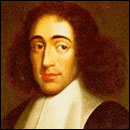

From The Tractatus Politicus
Chapter I - Introduction
(Page 1) – (studying politics impartially; as a manifestion of human nature)
Page 2 – (men do not act according to reason but from their general nature)
Chapter II – on Natural Right
Page 1 – (everything that is in nature has a right to be there)
Page 2 – (self-preservation is the proper goal for each person)
Page 3 – (man's free will results in actions which tend to preserve his existence)
Page 4 – (on dominion and Natural Law)
Page 5 – (on freedom and restraining the emotions)
Page 6 – (nothing can be done to alter the eternal decrees of (Deus sive Natura))
Chapter III – of the right of supreme authorities
Page 1 – (general decrees of the commonwealth take precedence over individual rights)
Page 2 – (reason dictates that living under law provides greater freedom for the individual)
Page 3 – (the power and rights of the commonwealth)
Page 4 – (religion should be free from civil authority)
Page 5 – (conclusion of Chapter III - on the relations of one commonwealth to another
Chapter IV – of the functions of supreme authorities
Page 1 – (on affairs of state)
Page 2 – (a commonwealth does wrong when it acts against the dictate of reason)
Page 3 – (civil law cannot be broken without loss of the commonwealth)
Chapter V – of the best state of a dominion
Page 1 – (if a state lacks peace and order it is a failure as a commonwealth)
Page 2 – (freedom not slavery is necessary for a peaceful commonwealth)
Chapter VI – of monarchy
Page 1 – (government by one man is not for the general welfare)
Page 2 – (kings rule from fear, liberty may be achieved if their power is constrained by the people)
Chapter VIII – of aristocracy
Page 1 – (of the formation and operation of two councils of patricians to rule the state)
Chapter XI – of democracy